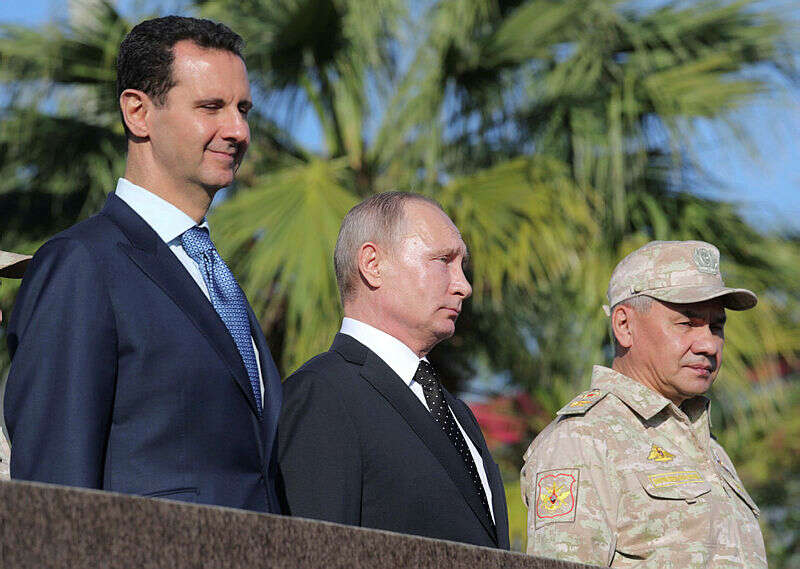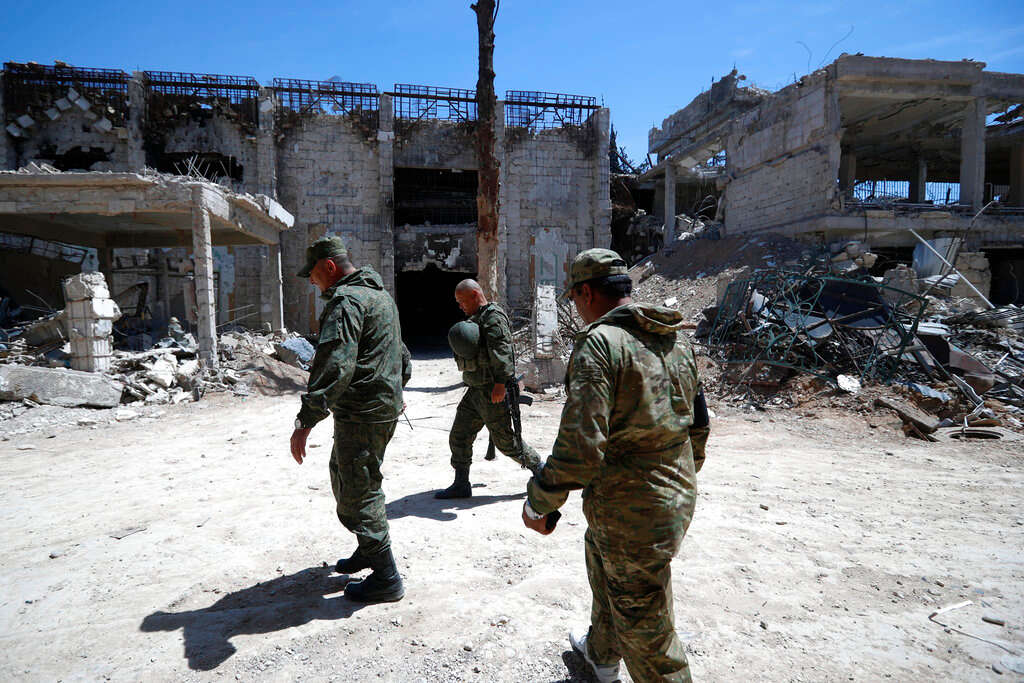by Daniel Siryoti and Shahar Klaiman
Israel can act freely against Iran and Hezbollah in Syria because "everyone understands that Israel isn't acting against the Syrian regime," former Military Intelligence official Brig. Gen. (res.) Yossi Kuperwasser says.
 |
| Syrian counterpart Bashar Assad, Russian President Vladimir Putin and Russian Defense Minister Sergei Shoigu at Hmeimim air base in the northwestern Syrian province of Latakia, December 11, 2017 | Archives: AFP/Mikhail Klimentyev |
A decade has passed since the outbreak of the Syrian civil war, and today the Syrian army relies more than ever on Russia and pro-Iranian militias.
According to assessments, Bashar Assad's army lost tens of thousands of soldiers. The collapse of his military forced Moscow to deepen its involvement in 2015 in conjunction with local militias loyal to the Assad regime.
At the same time, Hezbollah fighters from Lebanon and pro-Iranian militiamen played a significant role in the battles and replaced Syrian troops on the front lines. In a study published in 2019 by the Meir Amit Intelligence and Terrorism Information Center, 1,139 Hezbollah fighters were counted as killed in action from the outset of the civil war up until 2018. According to the study, some 10% of all Hezbollah casualties were senior officers and commanders, most of them hailing from southern Lebanon.
Brig. Gen. (res.) Yossi Kuperwasser, a senior research fellow at the Jerusalem Center for Public Affairs and former head of the Research Department at the IDF Military Intelligence Directorate, said Assad was currently in the process of rehabilitation despite the massive losses.
"From the beginning, the [Syrian] army leaned on Russian airstrikes, which changed the reality of this war," he explains.

The Syrian army "also relied on the forces dispatched by the Iranians and on the irregular forces the Syrians themselves arranged, chief among them Hezbollah. This reality is ongoing. Hezbollah is also active in the Golan Heights sector. Although the [Syrian] army is rehabilitating, it still isn't the force spearheading the campaign anywhere in the country. The brunt of its activity is taking place in the Idlib region," added Kuperwasser.
According to foreign reports, the chaos in Syria has allowed Israel to act against Iran's efforts to smuggle game-changing weapons to Hezbollah. Two months ago, aircraft attacked Assad forces and pro-Iranian militia positions in Deir ez-Zor in the country's east. Opposition news outlets in Syria reported that aircraft targeted Islamic Revolutionary Guard Corps positions in Albukamal. Last month, meanwhile, Syria's official SANA news agency reported an airstrike on the Syrian Golan and the international airport in Damascus.
'Israel is making it difficult for Iran'
"Israel, through its airstrikes on Iranian targets, has managed to make it difficult for Iran to transfer weapons to Hezbollah for the purpose of improving its precision missile capabilities," says Kuperwasser. "Israel has been able to torpedo a considerable portion of Iran's efforts to build terrorist infrastructure and bases in Syria. But all of these achievements do not equal 100%."
Kuperwasser notes that Iran has managed to build bases in Syria and position Hezbollah units on the Golan Heights, although their equipment is substandard and they are not very active.
In the meantime, Israel's relations with Russia have facilitated understandings with the Assad regime. Last month, Israel struck a deal for the release of a young Israeli woman who had willingly crossed the border into Syria and was held in a Damascus prison. According to foreign reports, Israel purchased Russian-made Sputnik coronavirus vaccines for $1.2 million, which were then delivered to the Assad regime. There have also been numerous reports that Russian soldiers were searching for the remains of former Mossad spy Eli Cohen at the Yarmouk Palestinian refugee camp in Damascus.
Amid this backdrop, the question begs whether the airstrikes attributed to Israel in Syria are harmful to these efforts. Kuperwasser, however, says the answer is no. "Everyone understands that Israel isn't acting against the Syrian regime," he says. "It also isn't doing anything that jeopardizes Russian interests."
Daniel Siryoti and Shahar Klaiman
Source: https://www.israelhayom.com/2021/03/17/israel-doesnt-jeopardize-russian-interests-in-syria/
Follow Middle East and Terrorism on Twitter
No comments:
Post a Comment